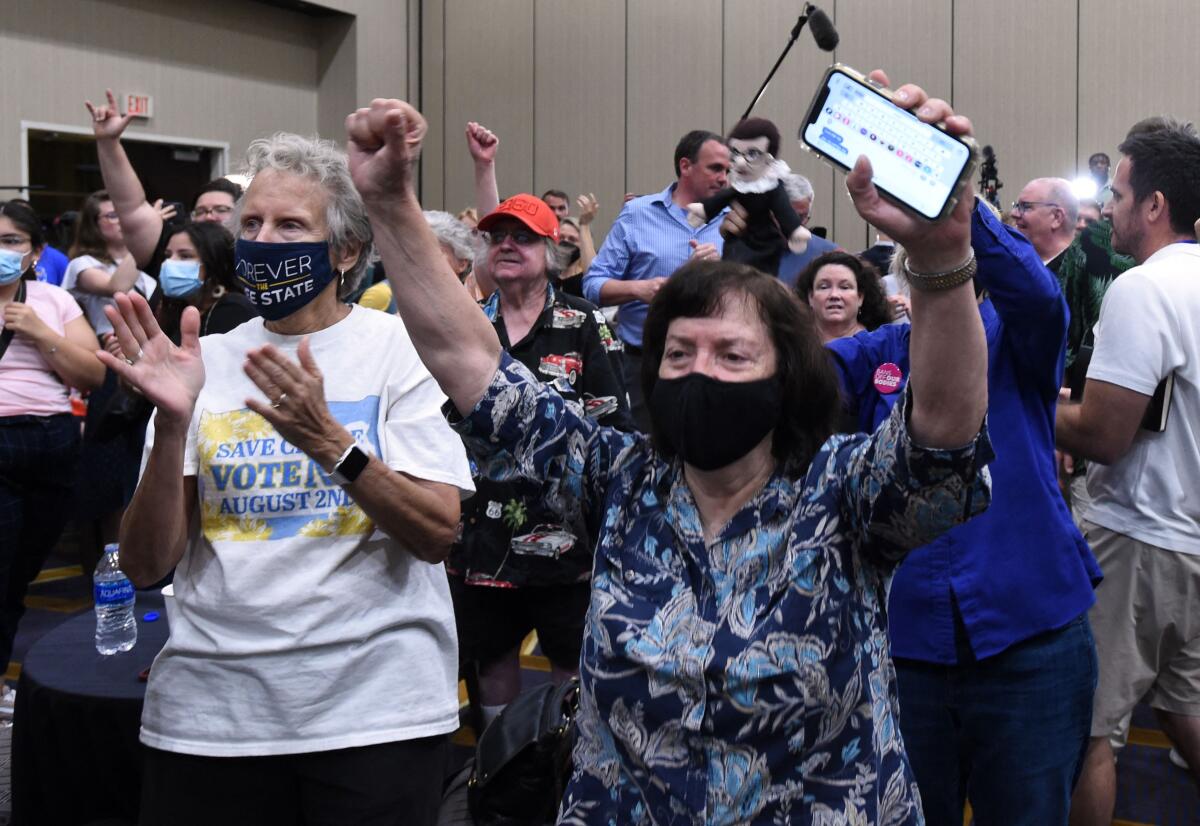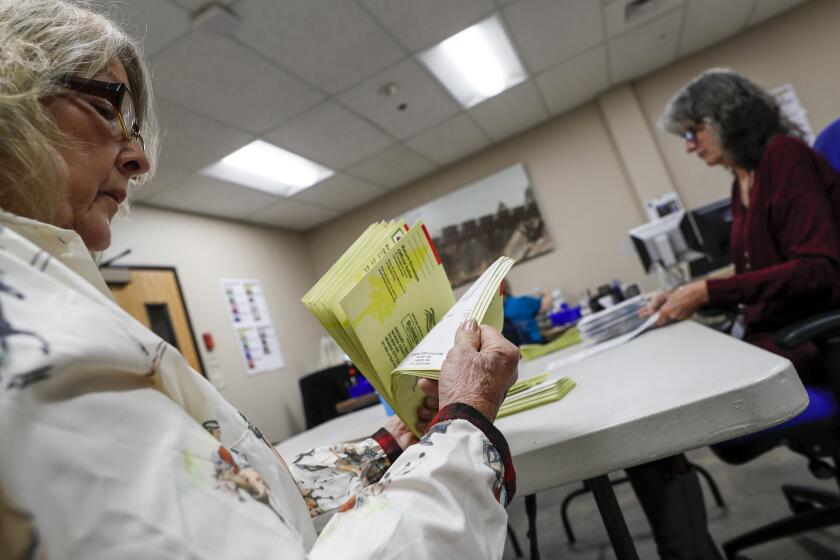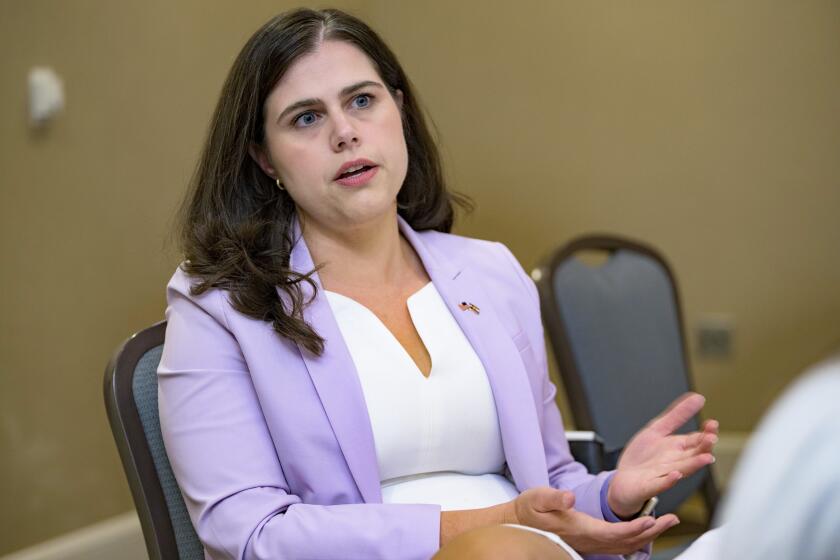Abortion vote recount with no chance of overturning result begins in Kansas. Why?

- Share via
TOPEKA, Kan. — Kansas on Tuesday began a partial hand recount of this month’s decisive statewide vote in favor of abortion rights, a move forced by two Republican activists even though the margin was so large that the recount won’t change the outcome.
Nine of the state’s 105 counties are doing the recount at the request of Melissa Leavitt, a resident of Colby, in far northwestern Kansas, who has pushed for tighter election laws. A longtime antiabortion activist, Mark Gietzen of Wichita, is covering most of the costs.
A larger-than-expected turnout of voters Aug. 2 rejected a ballot measure that would have removed protections for abortion rights from the Kansas Constitution and given the Legislature the right to further restrict abortion or ban it. It failed by 18 percentage points, or 165,000 votes statewide.
It drew broad attention because it was the first state referendum on abortion since the U.S. Supreme Court overturned Roe vs. Wade in June.
Why do a recount if it won’t change the outcome?
Gietzen and Leavitt have both suggested that there might have been problems without pointing to any actual examples or evidence. Gietzen acknowledged in an interview that he would be surprised if the Kansas recount changed the results, but that he wants “the system fixed.” He pointed to potential things that could have gone wrong, such as malicious software, inaccurate voter rolls and voting law violations, even though there is no evidence that happened.
Recounts increasingly are tools to encourage supporters of a candidate or cause to believe an election was stolen rather than lost. A wave of candidates who have echoed former President Trump’s lie that the 2020 election was rigged have called for recounts after losing their own Republican primaries.
Voters rejected a measure that would have let GOP lawmakers restrict or outlaw abortion. Can abortion rights activists replicate the win beyond Kansas?
In Nevada, attorney Joey Gilbert raised money to pay for a $190,000 recount that still showed him losing the GOP nomination for governor by 26,000 votes. In Colorado, county clerk Tina Peters raised $256,000 to pay for a recount that showed she gained 13 votes in her bid for the party nomination for secretary of state, but still lost by more than 88,000 votes. Both candidates continued to claim that they had actually won the election even as recounts showed they came nowhere close.
The refusal of candidates or campaigns to believe they could ever be defeated in an election is a dangerous development for American democracy, said Tammy Patrick, a former Arizona voting official who is now a senior advisor to the Democracy Fund.
“What we see now is people just don’t believe they lost because they’re constantly being fed these lies about the legitimacy of the process,” Patrick said. The call for recounts “keeps their base engaged, ginned up and donating,” she added.
Deb Otis of the nonprofit group Fair Vote wrote a report that found about two recounts occurred a year in statewide elections between 2000 and 2019, and in only three did the results change after the recounts uncovered tiny but significant flaws in the initial count.
“Voters will start losing track of when these claims are legitimate and when a state should pay for a recount,” Otis said.
Kansas law requires a recount if those who ask for it prove they can cover the counties’ costs. The counties pay only if the outcome changes.
A conservative activist has called off his request for a recount in a rural California election that was won in a landslide.
What’s the process in Kansas?
Kansas law says counties have five days following a request to complete a recount. The clock for the recount on the abortion measure started Monday, when the Kansas secretary of state’s office concluded that Gietzen and Leavitt could cover the costs.
All nine counties expect to finish by Saturday. Four started recounting by Tuesday, and one of those, Lyon County, planned to finish by day’s end. The other five planned to start Wednesday.
Where is the money coming from?
Leavitt and Gietzen provided credit cards to pay for the nearly $120,000 cost, according to the secretary of state’s office. Leavitt has an online fundraising page that had raised more than $47,000 as of Tuesday afternoon. Gietzen also said he was receiving donations from a network built over three decades in the antiabortion movement, but he declined to be more specific.
The two initially wanted the vote recounted in all 105 Kansas counties, but they couldn’t raise the required $229,000. Gietzen said the nine counties were chosen based in part on their population and cost.
Votes are being recounted in Douglas County, home to the University of Kansas’ main campus; Johnson County, in suburban Kansas City; Sedgwick County, home to Wichita; Shawnee County, home to Topeka; and Crawford, Harvey, Jefferson, Lyon and Thomas counties. Abortion opponents lost all of those counties except Thomas.
Since the 2020 election, election officials and workers have faced a barrage of harassment and threats, Some have quit and others are considering it.
Who is behind this?
Gietzen has been active in the antiabortion movement and frequently protests outside a clinic providing abortions in Wichita. He leads his own group, the Kansas Coalition for Life, which is separate from the larger and more influential Kansans for Life that wields significant power at the Statehouse. He has pushed legislation to ban most abortions at about the sixth week of pregnancy. Kansas law doesn’t do that until the 22nd week.
He also leads the Kansas Republican Assembly, which had some clout among the GOP’s conservative activists more than a decade ago before they solidified their hold over the state party organization. He is retired from aircraft manufacturer Boeing.
He’s run repeatedly and unsuccessfully for the Legislature, and he has been an activist against cities adding fluoride to their drinking water, something Wichita rejected in 2012.
“He’s so far right, he’s coming around the other side,” said former Republican state Rep. John Whitmer, host of a Wichita radio talk show. “There’s just not a lot of wiggle room with Mark.”
Leavitt owns a hobby and craft store in Colby. She has questioned how Thomas County is handling its elections. She served on a local election advisory group.
Get our L.A. Times Politics newsletter
The latest news, analysis and insights from our politics team.
You may occasionally receive promotional content from the Los Angeles Times.
Why is the result not going to change?
Voters in the nine counties where recounts are being held cast roughly 59% of the more than 922,000 ballots on the Aug. 2 ballot question. They rejected the abortion opponents’ measure by 31 percentage points — significantly larger than the statewide total.
Recounts almost never reverse the outcome of elections, even in the closest races. Since the Florida recount for the 2000 presidential race, more than 30 statewide elections across the U.S. have been the subject of recounts. The three that were overturned were decided by hundreds of votes — not thousands.
The largest lead erased by a statewide recount was 261 votes in Washington state’s 2004 election for governor. There is no precedent in U.S. history of a recount reversing the outcome of an election decided by more than 165,000 votes.
Even some strong abortion opponents see the recount as a waste of time and money. Whitmer said the money could be much better spent on GOP efforts to unseat Democratic Gov. Laura Kelly or on competitive legislative seats.
More to Read
Sign up for Essential California
The most important California stories and recommendations in your inbox every morning.
You may occasionally receive promotional content from the Los Angeles Times.













